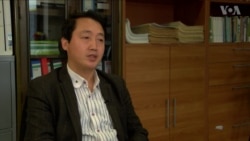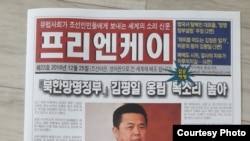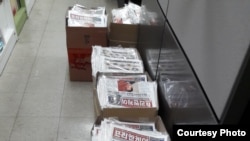Kim Joo Il’s quiet office in a suburb of southwest London could hardly be more different from the hardships he faced serving as a captain in the North Korean army.
Kim fled North Korea in 2005 by swimming across a river in his home province of northern Hamkyong. After four hours drifting in the river, he reached China. From there, he traveled through Vietnam, Cambodia and then Thailand, finally reaching Britain two years later.
He now edits the newspaper Free NK from the British capital, which aims to expose the reality of life in the isolated state and the abuses carried out by its government.
Kim says he fled his homeland because of growing despondency and disillusionment with North Korea’s dictatorship. He believes more North Koreans would try to flee if not for the fear of retaliation against family members left behind.
His hometown of Kilju-gun is in the same region where Kim Jong Un’s government has conducted six nuclear tests.
“I have relatives still living in Kilju, so I worry about radioactive damage and damage from the nuclear test that my family will have,” he says.
Speaking through a neighbor who served as a translator, Kim said there is a social class in North Korea that tries to protect its power, assets and money, and will never oppose the government. But, he said, there is another class — those who are hungry and lead difficult daily lives — who would like to resist.
“I would like to wake them up and give information to them, so I published the newspaper to deliver external information to them,” he explained.
“As a person who lived in North Korea, I desperately wanted information, and I published a newspaper called Free NK, because of the sense of urgency, the belief in the mission that I need to send external information into North Korea,” Kim continued.
“Although there are various media that can be used, the reason why I chose a newspaper is that there is no other media tool which general citizens can receive, and they are the basic mass who can change North Korean society.”
When Kim started the Free NK newspaper, his goal was to publish 10,000 newspapers to be airdropped into North Korea by balloon. However, the initial plan was unsuccessful because of weather conditions on the Korean peninsula.
“Usually, the wind blows from North to South, so we cannot launch balloons. So instead, we launched balloons from May or June to October” when the weather conditions are more favorable, he said.
At those times, Kim and his allies airdrop 5,000 to 10,000 newspapers every month, some of which Kim hopes will be picked up and read by impoverished North Koreans looking for food or firewood in the mountains.
Even if the balloons get shot down, the individually wrapped newspaper bundles fall and get distributed over a large area, he explained.
Kim hopes his efforts will help to change the mindset of the North Korean people, encouraging them to try to escape or to fight the government. But he also wants to use his newspaper to obtain and distribute more accurate information from inside North Korea, so that the international community can make better judgments on how to deal with the country.
Kim said he doubts that international sanctions will force North Korean leader Kim Jong Un to give up his pursuit of nuclear weapons.
“North Korea’s nuclear program is not aimed at securing victory in a war against the U.S. Instead, North Korea believes that nuclear development is a tool which rewards its regime and guarantees its regime, so it persists in nuclear development and provocation,” Kim said.
But he does believe the sanctions could bring matters to a head in Pyongyang, especially if China honors its commitment to enforce the sanctions.
“If China blocks oil or bans the entrance of North Korea's individual traders, or does not issue visas for North Korean citizens, then North Korea may face an internal crisis.”
Kim said the North Korean elites understand they cannot prevail in a nuclear war with the United States, but they are “obsessed with nuclear weapons and assets” as a tool to protect their rule and “as a card for negotiation.”
For that reason, he argued, the United States should seek to bring reform to North Korea through diplomacy rather than military power.
“The U.S. also needs to play a role to offer stability and peace in international society,” he said.








